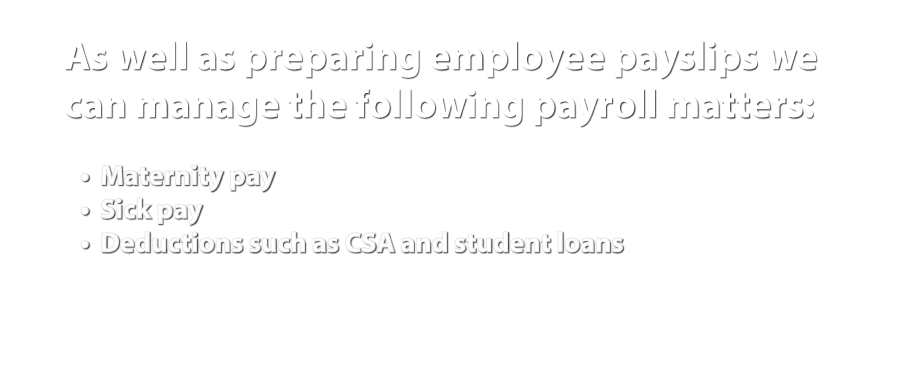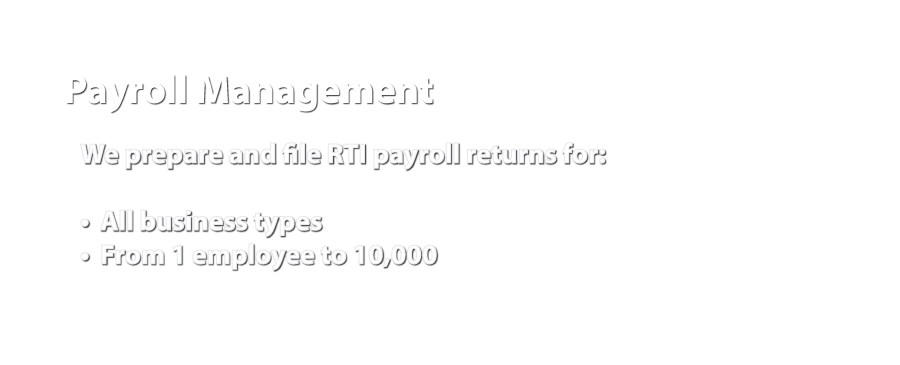What is Payroll?
These pages are designed to give you free information to help you
understand the implications of employing people. When you are an employee
payroll is the mechanism by which the employee gets paid. If you move from
employment into self employment then payroll means something different.
Payroll
In a business payroll is the
total cost of salaries for employees, wages, bonuses and other deductions.
Whilst in accounting terms, payroll means the amount of money paid to
employees.
Being an
employer
The self employed person becomes the employer. Employing others is
often a big step along the road of becoming a mature business. Whether you are
employing people from the start of your business or not you should consider how
payroll works in the UK.
Pay as You Earn
Scheme PAYE
All employers have a duty to comply with the law in relation to the
PAYE scheme, which is managed by HMRC.
How to Register
as an employer with HMRC
An employer has a need to register the business with Her
Majesties Revenue and customs HMRC, commonly known as the ‘Taxman’.
What payroll tax
returns must you make and how often?
Each month HMRC will need you to tell them how many people
you have employed, how much salary or wages you have paid them, and how much
you deducted for tax, National Insurance NI contributions and any other
deductions, such as maternity pay, Sick pay SSP along with other deductions.
Paying the right
amount of NI and tax deducted from employees to HMRC
As well as telling HMRC online about these things an
employer has to pay over to HMRC the exact sums they have deducted from their
employees.
How to outsource
payroll
Payroll and be very complicated to calculate, that is why
many employers outsource payroll. HMRC provide a tax calculator for employers
to calculate the appropriate taxes and deductions.
Payroll accounting software
Payroll software is technology
that streamlines and automates the process of paying your employees.
The functions of payroll software
include automatically calculating:
Tax; NI; Sick pay; holiday pay;
maternity pay and other deductions.
It will also calculate and print
the above wage calculations onto the employees pay slips. As well as P45 notices, P60’s and other year
end summaries.
They will have a built in and
regularly updated tax calculator.
Managing your
employees payroll
Payslips wages
These must carry details relating
to the employee. Such as their tax code and NIC number and Unique Tax Reference
number (UTR), the employees gross pay and net pay. The rate of pay for weekly
paid wages and monthly salary for monthly paid wages. The number of hours
worked for weekly calculated wages. As well as and deductions such as Tax; NI;
Sick pay; holiday pay; maternity pay and other deductions. Having a tax
calculator is very important.
Maternity pay
There are strict rules regarding paying mothers and fathers
when they have a child. It is very important that you read and understand the
HMRC guidance when employing someone to give you advice regarding any employee
who is pregnant or where their partner is pregnant.
Paid Sick Leave
The law protect both employers and employees with regard to
rights for employees to be paid when they are off sick. Both the employer and
employee have to follow the rules very carefully. HMRC refer to sick pay as Statutory Sick Pay
(SSP). It is very important that you read and understand the HMRC guidance when
employing someone who is off work because of sickness.
Holidays
The law provides for a minimum number of days holiday an
employee is entitled to be paid. Holidays and calculating holidays are a very
important part of the Human Resources (HR) process when employing others.
Having an holiday calculator is very important.
Deductions
The amount of money an employer
agrees to pay and employee in their wages multiplied by the number of hours
they work is called the gross pay or gross wages before tax. Every employer has
a duty to understand and apply the law regards top statutory deductions such as
Tax; NI; Sick pay; holiday pay; maternity pay and other deductions.
Once deductions have been taken
of the gross pay or wages then the amount which remains is called net pay after
tax.
This is very complicated and why
many employers purchase payroll accounting software and larger employers
employee a whole department called the HR department to manage the payroll and
HR matters.
NIC
Self employed people have to pay National Insurance
Contributions (NIC). Employers have to deduct from their employees the exact
amount of NI which HMRC specify is to be deducted from their pay. There are
complicated tables which calculate how much NI is to be deducted from an
employees wages. Payroll online and cloud software is a good way of calculating
the exact amount of NI to deduct.




